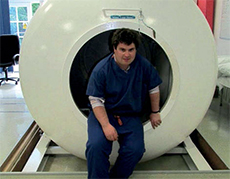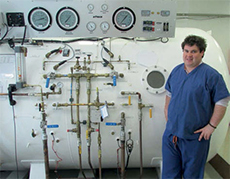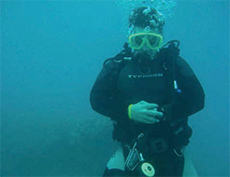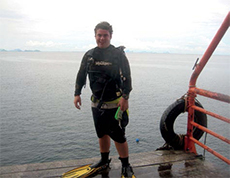




| Home | Features | Club Nights | Underwater Pics | Feedback | Non-Celebrity Diver | Events | 20 April 2024 |
| Blog | Archive | Medical FAQs | Competitions | Travel Offers | The Crew | Contact Us | MDC | LDC |

|

|
 
 |
    ISSUE 19 ARCHIVE - AT THE CHAMBERMungo FinlaysonI had been over in Dahab, Egypt for a quick trip to finalise all of my operations and confirm suppliers ready for the launch of my new company, Scuba Duba Dive (launched on 3rd of May 2013).Having completed over four hundred accident free dives during my six years as a qualified diver I had no reason to think that my time in Dahab in December 2012 would be any different. During the week that I spent there I completed 10 dives over various different dive sites around Dahab, reaching a maximum depth of 30 meters and a minimum of 16 meters. It was great to visit familiar sites again as well as some exciting new ones. My only complaint was that the weather wasn't the best for Dahab at that time of year, around 18-20 degrees, and during surface intervals I found myself getting surprisingly cold. On my final day of diving we visited Dahab's famous ‘Blue Hole' dive site. It was fair to say that I was a little nervous about diving the Blue Hole after finding some videos on YouTube prior to my trip that seemed to suggest that the site was a magnet for diving accidents. Cautious but determined I completed two dives in different parts of the Blue Hole. Both were fairly deep dives to 40 meters but we followed safety protocol exactly and added plenty of safety stops, so as far as I was concerned we were more than safe whilst ascending from a deep dive. That evening, after my last dive, I continued to feel unusually cold and stupidly I hadn't really prepared for this dilemma and had little appropriate clothing to get warm again. Cursing the unusually cold Dahab weather I went on to enjoy my last evening with a few well earned holiday drinks. The next evening I was due to fly back to London, this was around 30 hours after my last dive. As the recommended surface time before flying is 24 hours I was confident that all was well. The flight was just like any other 6 hour trip in the air, a tad boring but luckily I was asleep for most of the journey. As the flight didn't get back into Gatwick till quite late, and being from Aberdeen, I stayed with family just near Gatwick that evening and wiped out from my busy week in Dahab, I slept soundly. However upon waking up the next day about mid- morning I knew that something wasn't right. I felt a slight tingling sensation, similar to pins and needles, in my left arm around my elbow. Luckily my first thought was that it could be something dive related - but then again I'd had a week of very safe diving, surely not? DCI only happens when accidents occur during the dive and safety stops are missed or miscalculated...doesn't it? I thought about things over the next few hours, the tingling sensation was not subsiding and I was due to fly back to Aberdeen that evening. I knew seeing a dive doctor would mean missing my flight but flying with a suspected bend would be even worse. Trusting my judgment, due to the training and basic knowledge I have on DCI sickness, I decided to phone the London Diving Chamber's 24 hour national advice line. They were extremely helpful and knowledgeable, advising that I came into hospital to get checked over by a specialist as the symptoms I'd described were synonymous with decompression sickness. After travelling up to London and arriving at the hospital, I was very promptly seen by Dr Oliver Firth who then assessed me for suspected DCI. Dr Firth explained that DCI can be difficult to diagnose when experiencing symptoms such as mine when it's mid joint pain and loss of sensation, however it is still important to recognize and seek appropriate treatment immediately. Dr Firth explained that many divers with similar symptoms, who have also not had an unusual dive, will ignore the symptoms, not believing it could be DCI, until they get much worse, which can then prolong treatment time. The recommended treatment for me was a Navy Treatment Table 62 with 2 extensions, this meant that my first stint in the chamber was for 5.45 hours! This was then followed up a table 66 in the morning which was a much more manageable 1.45 hours. No return to Aberdeen for me that day! I'd seen diving chambers before but I'd never been inside one, the one at LDC is a ‘traditional' shaped chamber and looks just like a submarine. All prepared to take my phone and gadgets inside when I discovered to my horror that only books and magazines were allowed - luckily they had a great selection at the chamber. Once inside the chamber, myself and a very friendly nurse called Emma from the London Diving Chamber team, began descending down to 18m to start the first phase of the treatment. This involved breathing 100% oxygen at depth for 20 minutes at a time with 5 minute air breaks in between. Once this part of the treatment was complete the most exciting part was being sent takeaway menus via the medical lock and being told to choose what you want to eat. With loads of options, you're told to order what you want as it's important to keep you fed, hydrated and energised throughout the treatment. A range of Thai dishes were delivered to us down at 9m after we'd had a slow 30 minute ascent from 18m, we then had a 15 minute break to eat the cuisine. The second half of the treatment at 9m seemed to go on and on as you are required to be on O2 for 1 hour at a time so getting out at the end was a big relief. As I was staying over an hour outside of London they arranged accommodation in the ward above the chamber for me so I could be back at 9am for the second treatment. Dr Oliver Firth reassessed me in the morning to see if the symptoms were improving. In my case I still felt some tingling so two more sessions at table 66 were required (1.45 hours). After those were complete I was discharged and finally made my way back up to Aberdeen on a fully packed train due to it being the week before Christmas. All in all I can highly recommend my experience at London Diving Chamber. From start to finish all of the staff were helpful, professional and supportive. It just goes to show, you can be a very experienced diver, dive safe dives and still develop signs of decompression sickness. There are many contributing factors that cause DCI, and many are still not fully understood, so if you are in doubt I would always recommend speaking with an expert. It's always better to be safe than sorry. My experience hasn't put me off diving and if anything has made me more passionate about starting Scuba Duba Dive, I feel now I'm an even more knowledgeable diver and hope to pass my experiences and knowledge onto my customers. For our national 24 hour advice line call 07940 353 816 to speak to a member of the team. Our chambers cover most of the UK and staff are on hand 24/7 for your diving emergencies. |